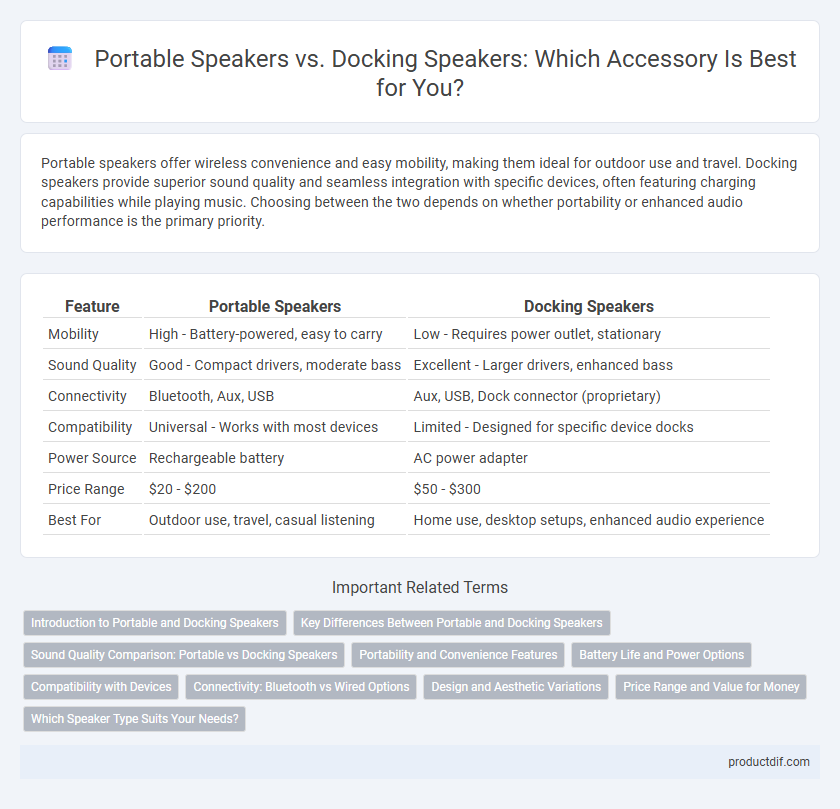Portable speakers offer wireless convenience and easy mobility, making them ideal for outdoor use and travel. Docking speakers provide superior sound quality and seamless integration with specific devices, often featuring charging capabilities while playing music. Choosing between the two depends on whether portability or enhanced audio performance is the primary priority.
Table of Comparison
| Feature | Portable Speakers | Docking Speakers |
|---|---|---|
| Mobility | High - Battery-powered, easy to carry | Low - Requires power outlet, stationary |
| Sound Quality | Good - Compact drivers, moderate bass | Excellent - Larger drivers, enhanced bass |
| Connectivity | Bluetooth, Aux, USB | Aux, USB, Dock connector (proprietary) |
| Compatibility | Universal - Works with most devices | Limited - Designed for specific device docks |
| Power Source | Rechargeable battery | AC power adapter |
| Price Range | $20 - $200 | $50 - $300 |
| Best For | Outdoor use, travel, casual listening | Home use, desktop setups, enhanced audio experience |
Introduction to Portable and Docking Speakers
Portable speakers offer wireless convenience with Bluetooth connectivity, allowing users to play music anywhere without the need for cables or fixed placement. Docking speakers, designed primarily for devices like iPods and smartphones, provide high-quality sound with charging capabilities and physical docking stations. Both types enhance audio experiences but cater to different usage preferences and mobility needs.
Key Differences Between Portable and Docking Speakers
Portable speakers prioritize wireless connectivity and battery-powered mobility, enabling use anywhere without the need for a fixed power source. Docking speakers typically offer enhanced sound quality and charging capabilities but require physical connection and power supply, limiting their portability. Key differences include portability, power source, connectivity options, and audio performance, with portable speakers excelling in on-the-go use, while docking speakers provide superior sound in stationary setups.
Sound Quality Comparison: Portable vs Docking Speakers
Portable speakers typically offer convenience and wireless connectivity but often have limited sound quality due to smaller drivers and less powerful amplifiers. Docking speakers, designed to accommodate specific devices, generally provide richer audio output with enhanced bass response and clearer midrange frequencies thanks to larger speaker components and dedicated power sources. Sound quality comparison reveals docking speakers excel in delivering immersive, high-fidelity audio, while portable speakers prioritize portability and versatility at the expense of some acoustic performance.
Portability and Convenience Features
Portable speakers offer unmatched mobility with lightweight designs and built-in rechargeable batteries, allowing seamless use in various outdoor and indoor settings. Docking speakers, while less portable due to their bulkier structure and dependence on power outlets, provide integrated charging docks and enhanced connectivity options for compatible devices. The convenience of portable speakers lies in wireless pairing and compact size, whereas docking speakers excel in stable device placement and superior sound amplification when stationary.
Battery Life and Power Options
Portable speakers offer the advantage of extended battery life with rechargeable lithium-ion batteries, enabling hours of wireless playback without the need for a power outlet. Docking speakers typically rely on a direct power source, limiting their use to locations with accessible electrical outlets and offering uninterrupted audio but no battery operation. Users prioritizing mobility and outdoor use benefit from portable models, while those seeking consistent power and sound quality indoors may prefer docking speakers.
Compatibility with Devices
Portable speakers offer broad compatibility with multiple devices through Bluetooth, NFC, and auxiliary inputs, enabling seamless connection with smartphones, tablets, and laptops across various operating systems. Docking speakers typically require specific device models or connector types, such as Apple's Lightning or older 30-pin docks, limiting their usability to compatible products only. Understanding device compatibility ensures optimal audio performance and user convenience when selecting between portable and docking speaker options.
Connectivity: Bluetooth vs Wired Options
Portable speakers primarily rely on Bluetooth connectivity for wireless convenience, enabling seamless pairing with smartphones, tablets, and laptops without the need for cables. Docking speakers often provide wired options such as AUX, USB, or proprietary docking connectors, delivering stable audio transmission and charging simultaneously while connected. Bluetooth technology in portable speakers offers versatility and mobility, whereas docking speakers prioritize consistent sound quality and power supply through physical connections.
Design and Aesthetic Variations
Portable speakers often feature compact, lightweight designs with sleek, modern aesthetics emphasizing mobility and convenience, utilizing materials like durable plastics and rubberized coatings for enhanced grip and drop resistance. Docking speakers typically present a more substantial, stationary design with refined finishes such as wood, metal, or high-gloss plastic, aimed at complementing home decor while integrating charging and connectivity docks for smartphones or MP3 players. The design variation between these accessories highlights portability and ruggedness versus elegance and multifunctionality tailored for stationary use.
Price Range and Value for Money
Portable speakers generally come in a more affordable price range, typically between $30 and $150, offering great value for money with their convenience and wireless capabilities. Docking speakers are often pricier, ranging from $100 to $300, but they provide superior sound quality and seamless integration with specific devices. Consumers seeking budget-friendly options with mobility favor portable speakers, while audiophiles prioritize docking speakers for enhanced audio performance.
Which Speaker Type Suits Your Needs?
Portable speakers deliver wireless convenience and versatility, ideal for on-the-go use and outdoor environments, with features like Bluetooth connectivity and rechargeable batteries. Docking speakers excel in providing superior sound quality and charging capabilities when paired with specific devices, best suited for stationary use such as home offices or bedrooms. Choosing between portable and docking speakers depends on your lifestyle needs, prioritizing either mobility and battery life or enhanced audio performance and integration.
Portable speakers vs docking speakers Infographic

 productdif.com
productdif.com